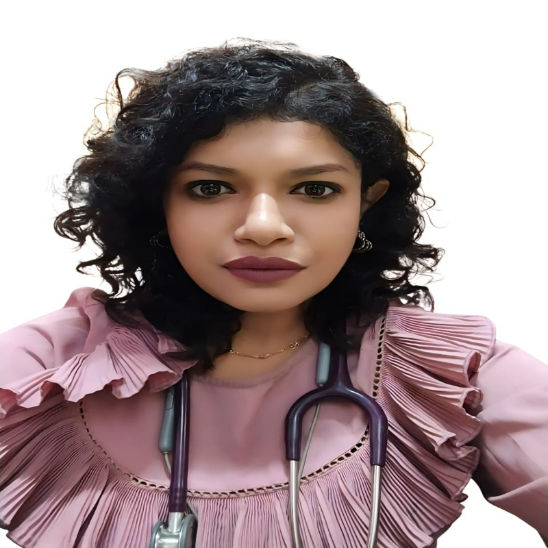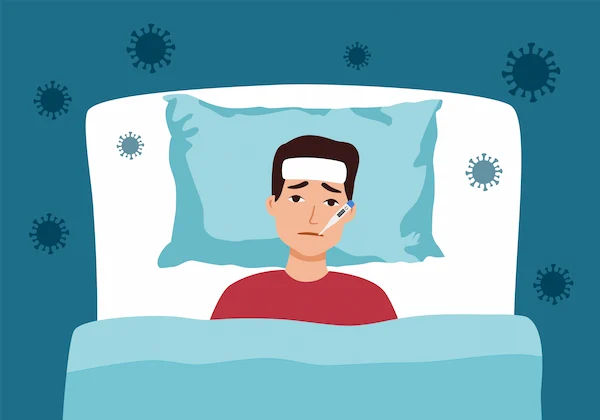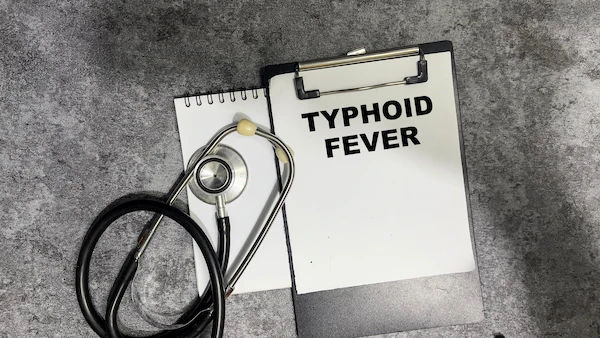Early Signs Of Typhoid Fever
Learn to recognize the early signs of typhoid fever, including symptoms to watch for and when to seek medical attention for timely treatment.

Written by Dr. J T Hema Pratima
Reviewed by Dr. D Bhanu Prakash MBBS, AFIH, Advanced certificate in critical care medicine, Fellowship in critical care medicine
Last updated on 13th Jan, 2026
.webp?tr=q-80,f-webp,w-350,dpr-2,c-at_max 700w)
Introduction
Typhoid fever is a serious bacterial infection that, despite being rare in industrialized nations, remains a significant health threat in many parts of the world. Caused by the bacterium Salmonella Typhi, it spreads through contaminated food and water. The challenge with typhoid is that its early signs are often deceptively mild and can easily be mistaken for a common flu or stomach bug. This misdiagnosis can lead to dangerous delays in treatment. Recognizing the initial symptoms is crucial for getting effective medical care and preventing severe complications. This guide will walk you through the specific, telltale early signs of typhoid fever, how the illness progresses, and the critical steps to take if you suspect an infection. Knowing what to look for could make all the difference in your recovery.
What is Typhoid Fever?
Typhoid fever is a life-threatening illness caused by the bacterium Salmonella enterica serotype Typhi. It is not synonymous with general food poisoning caused by other Salmonella strains. This specific bacterium invades the bloodstream and intestinal tract, causing a systemic infection that requires antibiotic treatment.
Consult a General Physician for the best advice
How Do You Get Typhoid? Understanding the Transmission
Humans are the only carriers of S. Typhi. The infection spreads through the "faecal-oral route." This means an infected person passes the bacteria in their stool. If that person handles food without proper handwashing, or if sewage contaminates a water supply used for drinking or washing food, the bacteria can be ingested by others. This is why typhoid fever is more common in areas with poor sanitation and limited access to clean water. Even after recovery, a small percentage of people (called carriers) continue to harbor the bacteria and can unknowingly spread it.
The First Week: The Early Signs and Symptoms
The incubation period for typhoid is typically 6 to 30 days after exposure. The illness often begins gradually, with symptoms worsening over the course of several days.
The Signature Fever Pattern
One of the most characteristic early signs of typhoid is the fever pattern. It doesn't spike suddenly. Instead, it starts low and increases gradually each day, often climbing to 104°F (40°C) or higher by the end of the first week. This "step-ladder" pattern, where temperature rises, plateaus, and then rises again, is a classic, though not universal, indicator that differentiates it from more common illnesses.
Gastrointestinal Distress: More Than Just a Stomach Bug
While gastrointestinal issues are common, their nature in typhoid can be unique:
Abdominal Pain and Tenderness: Many patients experience aching pain, often localized to the right lower abdomen where the ileum (part of the small intestine) is located.
Constipation vs. Diarrhoea: Contrary to popular belief, adults with early typhoid are more likely to experience constipation rather than diarrhoea. Young children, however, more commonly present with diarrhoea. This variation often leads to initial misdiagnosis.
Systemic Symptoms: Feeling Universally Unwell
The bacteria affect the entire body, leading to profound systemic symptoms:
Severe Headache: A persistent, throbbing headache is a very common early complaint.
Profound Weakness and Fatigue: This isn't just ordinary tiredness; it's an overwhelming sense of exhaustion and malaise that makes even small tasks difficult.
Body Aches and Chills: Muscle aches and chills often accompany the rising fever.
Loss of Appetite: A complete disinterest in food is typical.
The "Rose Spots" Rash: A Rare but Classic Sign
A less common but textbook sign is the appearance of "rose spots," faint, pink, blanching spots about 1-4 cm in diameter, primarily on the neck and abdomen. They appear in clusters and usually occur during the first or second week of fever. While a definitive sign, they are seen in fewer than 30% of patients and are often difficult to spot on darker skin tones.
How Symptoms Progress Without Treatment
If left untreated, typhoid fever can progress into a severe, life-threatening illness over the course of a few weeks. The high fever can continue, and the abdominal pain may become severe. Patients may become delirious, lying motionless and exhausted in what's known as the "typhoid state." Serious complications can develop, including intestinal hemorrhage (bleeding) or perforation, which require emergency surgery. This underscores why recognizing the early symptoms of typhoid and seeking prompt antibiotic treatment is absolutely critical.
Typhoid vs. Other Common Illnesses: How to Tell the Difference?
Distinguishing typhoid from other common tropical or febrile illnesses can be challenging but is aided by looking at key differences.
Typhoid Fever vs. Malaria
Both cause high fever, headache, and body aches. However, malaria fevers often occur in cyclical patterns, shaking chills followed by a high fever and sweating, repeating every 48 or 72 hours. Typhoid fever is more constant and associated with prominent gastrointestinal symptoms like abdominal pain, which are less common in malaria.
Typhoid Fever vs. Common Flu (Influenza)
The flu comes on abruptly with respiratory symptoms like a runny nose, sore throat, and dry cough. Typhoid begins gradually, and respiratory symptoms are rare. The profound abdominal pain and step-ladder fever of typhoid are not features of influenza.
Typhoid Fever vs. Viral Gastroenteritis
"Stomach flu" is characterized by the sudden onset of violent vomiting and diarrhoea. Typhoid typically has a slower onset, less vomiting, and is more associated with constipation in adults and a steadily rising fever.
Who is Most at Risk for Typhoid?
People at higher risk for typhoid include:
Travellers to endemic areas (especially South Asia, Africa, and South America).
Laboratory workers handling S. Typhi.
People in close contact with a known typhoid carrier.
Individuals living in or visiting communities with poor sanitation.
When to Seek Immediate Medical Attention
Do not wait. If you develop a fever after traveling to a high-risk area, or if you experience a steadily rising fever accompanied by severe headache, abdominal pain, or weakness, you must consult a doctor immediately. Be sure to inform your healthcare provider of your recent travel history. Early diagnosis with a blood, stool, or bone marrow culture and prompt treatment with antibiotics drastically improve outcomes and reduce the risk of complications.
Diagnosis and Treatment: What to Expect
A doctor will confirm typhoid fever through cultures of your blood, stool, or urine. The mainstay of treatment is antibiotics, such as azithromycin, ciprofloxacin, or ceftriaxone. Due to growing antibiotic resistance, it's essential to complete the full course prescribed. Supportive care, including rehydration and managing fever, is also vital. Most people begin to improve within 2-3 days of starting antibiotics, but a full recovery can take weeks.
Get Your Health Assessed
Conclusion
Recognizing the early signs of typhoid fever is a critical skill, particularly for international travellers. While the initial symptoms can be vague, the combination of a steadily climbing fever, significant abdominal discomfort, and profound weakness should never be ignored, especially with a relevant travel history. Typhoid is a serious but treatable disease. Your best defense is a combination of prevention through vaccination and safe practices, and awareness that enables you to seek diagnosis and treatment at the very first sign of illness. Trust your instincts; if you feel unusually and progressively unwell after potential exposure, err on the side of caution and see a doctor promptly. Your health is worth it.
Consult a General Physician for the best advice
Consult a General Physician for the best advice

Dr. Rajib Ghose
General Physician/ Internal Medicine Specialist
25 Years • MBBS
East Midnapore
VIVEKANANDA SEBA SADAN, East Midnapore

Dr. Hariprasath J
General Physician/ Internal Medicine Specialist
19 Years • MD (Gen Med), FCCP, Dip (Diabetology, UK)
Chennai
Apollo First Med Hospitals P H Road, Chennai
(225+ Patients)

Dr. Imtiyaz Khan
General Physician/ Internal Medicine Specialist
6 Years • MBBS
Bengaluru
Apollo Clinic, Sarjapur Road, Bengaluru

Dr. Naresh
General Physician/ Internal Medicine Specialist
5 Years • MBBS, MD (General Medicine)
Mahbubnagar
SIMS HOSPITAL, Mahbubnagar

Dr. Sriya Mukherjee
General Practitioner
10 Years • MBBS
Kolkata
SEVA POLYCLINIC, Kolkata


